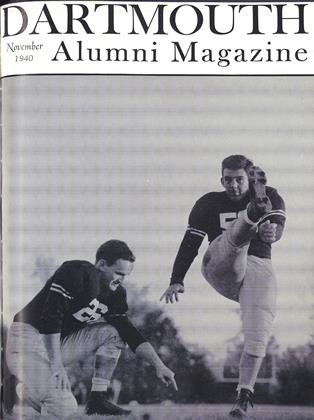GETTING BACK to the spirit of the College community on defense activity, it is essential in this dicussion to say that willingness to give hands and minds to defense work does not mean that those so serving thereby relinquish their privilege of critical opinion. If the mistakes of the past and the present are to be avoided in the future it is not only the right or privilege of every citizen to examine vital things of the past and present critically, it is his duty and responsibility to do so.
J. S. Mill in his great essay on "Liberty" said: "The fatal tendency of mankind to leave off thinking about a thing when it is no longer doubtful, is the cause of half their errors. A contemporary author has well spoken of 'the deep slumber of a decided opinion.' "
The eternal and exciting quest of the liberal college is for true progress of men and the world in which they live. The success of the search can only be judged by what its alumni strive to do and by what kind of men they are in later life. There are nearly 20,000 alumni of the College. They are the product of the institution. In their hands rests the power, a tremendous potential force, to translate the ideals and aspirations of the College into actual words, deeds, and influences.
"Academic freedom" does not mean unbridled license for the individual teacher in respect to speech or action. He is subject no Conscription just as much as any other American. But his talents are enlisted for life (not just for "the duration") under the banner of a college or university as a leader in the search for better things. The respect of men for these institutions of learning, which are as near permanent and enduring as anything we have, has resulted in granting them academic freedom. This is the privilege of pursuing scholarly research in unbiased fashion and making the results available to present and future generations of students. Academic freedom is a responsibility and a rather sacred one, to be cherished and used with discretion, not to be abused.
We believe the academic community understands and appreciates this privilege and obligation. Meanwhile it asks no special freedom for individuals, and approaches the work of national defense and related activity in a genuine oneness of spirit with the rest of the country.
BECAUSE OF nation wide interest in socialized medicine action taken by the faculty and staff of the College is of more than local Hanover interest. For the modest fee of $2 per family per month generous hospitalization benefits are provided by the group insurance plan put into operation last month. This is a long way from a more comprehensive plan of complete coverage on doctor's bills and clinical fees, as well as hospitalization. But it is a progressive move that shows how closely knit is the Hanover community in considering, studying, and adopting hospitalization group insurance—all within a period of a few months. Max A. Norton 'l9, bursar of the College, is to be credited with a major achievement in this important matter.
 View Full Issue
View Full Issue
More From This Issue
-
 Article
ArticleCharles A. Proctor
November 1940 By JOHN HURD JR. '21 -
 Article
ArticleCan I Get In?
November 1940 By COREY FORD -
 Class Notes
Class Notes1926*
November 1940 By CHARLES S. BISHOP, CLARENCE G. MCDAVITT JR. -
 Class Notes
Class Notes1918*
November 1940 By ERNEST H. EARLEY, DONALD L. BARR -
 Class Notes
Class Notes1931*
November 1940 By CHARLES S. MCALLISTER, CRAIG THORN JR. -
 Class Notes
Class Notes1921*
November 1940 By CHARLES A. STICKNEY JR., ROGER C. WILDE
The Editor
-
 Article
ArticleA Contagions Example
October 1935 By The Editor -
 Article
ArticleGradus Ad Parnassum
November 1938 By The Editor -
 Article
ArticleDistinctive Individuality
May 1940 By The Editor -
 Article
ArticleIn Fine Fettle
June 1940 By The Editor -
 Article
ArticleThe Inn
March 1942 By The Editor -
 Article
ArticleGRADUS AD PARNASSUM
May 1942 By The Editor







